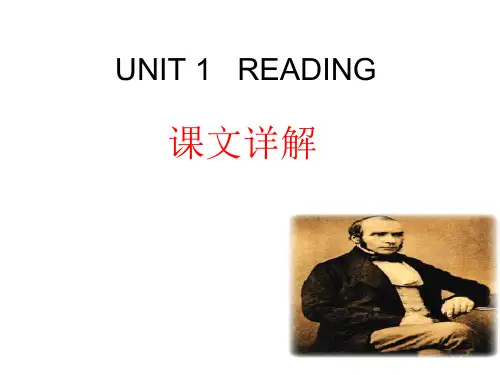人教版高中英语必修五unit1 reading
- 格式:pptx
- 大小:8.51 MB
- 文档页数:31
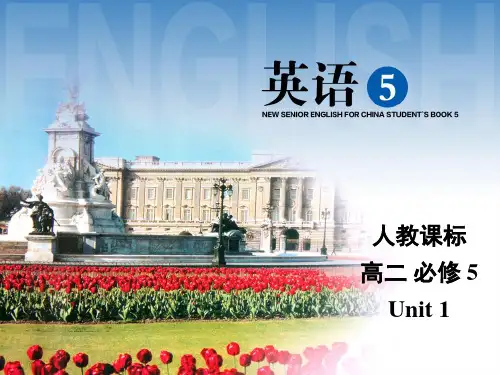

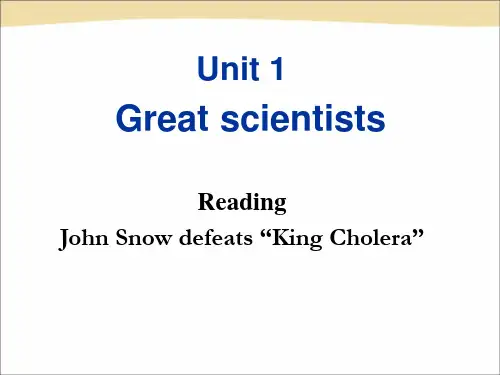
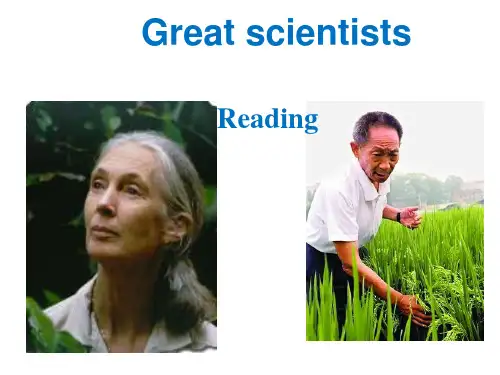
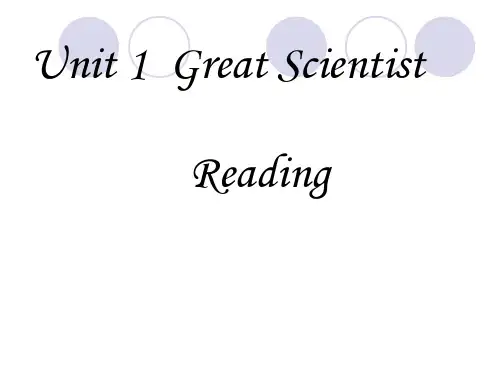

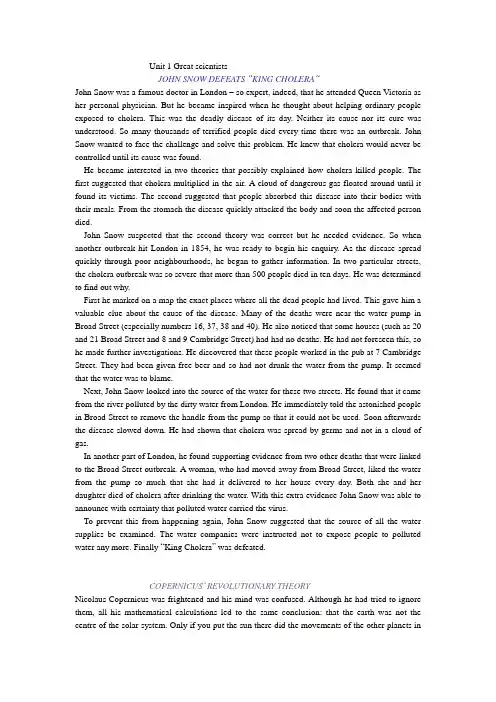
Unit 1 Great scientistsJOHN SNOW DEFEATS “KING CHOLERA”John Snow was a famous doctor in London – so expert, indeed, that he attended Queen Victoria as her personal physician. But he became inspired when he thought about helping ordinary people exposed to cholera. This was the deadly disease of its day. Neither its cause nor its cure was understood. So many thousands of terrified people died every time there was an outbreak. John Snow wanted to face the challenge and solve this problem. He knew that cholera would never be controlled until its cause was found.He became interested in two theories that possibly explained how cholera killed people. The first suggested that cholera multiplied in the air. A cloud of dangerous gas floated around until it found its victims. The second suggested that people absorbed this disease into their bodies with their meals. From the stomach the disease quickly attacked the body and soon the affected person died.John Snow suspected that the second theory was correct but he needed evidence. So when another outbreak hit London in 1854, he was ready to begin his enquiry. As the disease spread quickly through poor neighbourhoods, he began to gather information. In two particular streets, the cholera outbreak was so severe that more than 500 people died in ten days. He was determined to find out why.First he marked on a map the exact places where all the dead people had lived. This gave him a valuable clue about the cause of the disease. Many of the deaths were near the water pump in Broad Street (especially numbers 16, 37, 38 and 40). He also noticed that some houses (such as 20 and 21 Broad Street and 8 and 9 Cambridge Street) had had no deaths. He had not foreseen this, so he made further investigations. He discovered that these people worked in the pub at 7 Cambridge Street. They had been given free beer and so had not drunk the water from the pump. It seemed that the water was to blame.Next, John Snow looked into the source of the water for these two streets. He found that it came from the river polluted by the dirty water from London. He immediately told the astonished people in Broad Street to remove the handle from the pump so that it could not be used. Soon afterwards the disease slowed down. He had shown that cholera was spread by germs and not in a cloud of gas.In another part of London, he found supporting evidence from two other deaths that were linked to the Broad Street outbreak. A woman, who had moved away from Broad Street, liked the water from the pump so much that she had it delivered to her house every day. Both she and her daughter died of cholera after drinking the water. With this extra evidence John Snow was able to announce with certainty that polluted water carried the virus.To prevent this from happening again, John Snow suggested that the source of all the water supplies be examined. The water companies were instructed not to expose people to polluted water any more. Finally “King Cholera” was defeated.COPERNICUS’ REVOLUTIONARY THEORYNicolaus Copernicus was frightened and his mind was confused. Although he had tried to ignore them, all his mathematical calculations led to the same conclusion: that the earth was not the centre of the solar system. Only if you put the sun there did the movements of the other planets inthe sky make sense. Yet he could not tell anyone about his theory as the powerful Christian Church would have punished him for even suggesting such an idea. They believed God had made the world and for that reason the earth was special and must be the centre of the solar system.The problem arose because astronomers had noticed that some planets in the sky seemed to stop, move backward and then go forward in a loop. Others appeared brighter at times and less bright at others. This was very strange if the earth was the centre of the solar system and all planets went round it.Copernicus had thought long and hard about these problems and tried to find an answer. He had collected observations of the stars and used all his mathematical knowledge to explain them, but only his new theory could do that. So between 1510 and 1514 he worked on it, gradually improving his theory until he felt it was complete.In 1514 he showed it privately to his friends. The changes he made to the old theory were revolutionary. He placed a fixed sun at the centre of the solar system with the planets going round it and only the moon still going round the earth. He also suggested that the earth was spinning as it went round the sun and this explained changes in the movement of the planets and in the brightness of the stars. His friends were enthusiastic and encouraged him to publish his ideas, but Copernicus was cautious. He did not want to be attacked by the Christian Church, so he only published it as he lay dying in 1543.Certainly he was right to be careful. The Christian Church rejected his theory, saying it was against God’s idea and people who supported it would be attacked. Yet Copernicus’ theory is now the basis on which all our ideas of the universe are built. His theory replaced the Christian idea of gravity, which said things fell to earth because God created the earth as the centre of the universe. Copernicus showed this was obviously wrong. Now people can see that there is a direct link between his theory and the work of Isaac Newton, Albert Einstein and Stephen Hawking.。
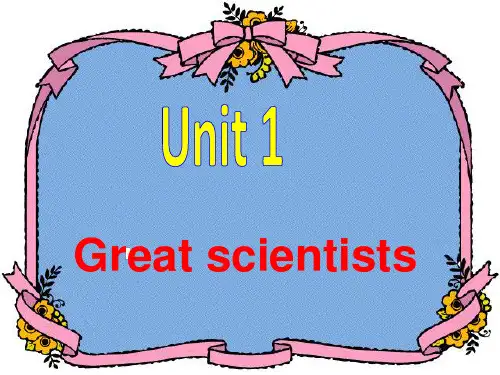
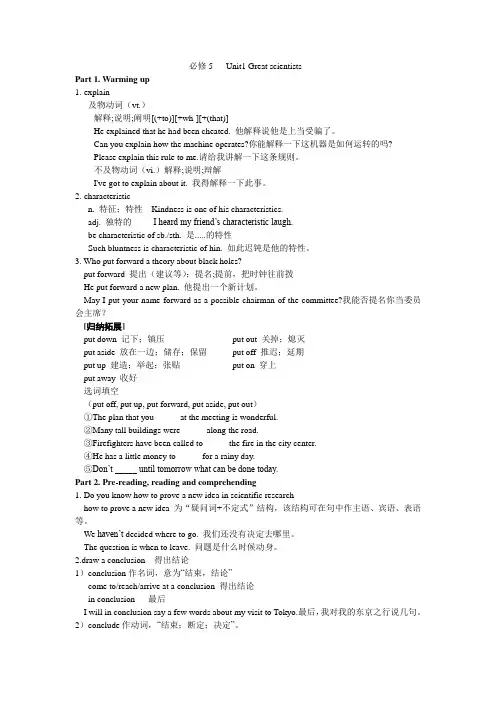
必修5 Unit1 Great scientistsPart 1. Warming up1.explain及物动词(vt.)解释;说明;阐明[(+to)][+wh-][+(that)]He explained that he had been cheated. 他解释说他是上当受骗了。
Can you explain how the machine operates?你能解释一下这机器是如何运转的吗?Please explain this rule to me.请给我讲解一下这条规则。
不及物动词(vi.)解释;说明;辩解I've got to explain about it. 我得解释一下此事。
2.characteristicn. 特征;特性Kindness is one of his characteristics.adj. 独特的I heard my friend’s characteristic laugh.be characteristic of sb./sth. 是.....的特性Such bluntness is characteristic of hin. 如此迟钝是他的特性。
3. Who put forward a theory about black holes?put forward 提出(建议等);提名;提前,把时钟往前拨He put forward a new plan. 他提出一个新计划。
May I put your name forward as a possible chairman of the committee?我能否提名你当委员会主席?[归纳拓展]put down 记下;镇压put out 关掉;熄灭put aside 放在一边;储存;保留put off 推迟;延期put up 建造;举起;张贴put on 穿上put away 收好选词填空(put off, put up, put forward, put aside, put out)①The plan that you _____ at the meeting is wonderful.②Many tall buildings were _____ along the road.③Firefighters have been called to _____ the fire in the city center.④He has a little money to _____ for a rainy day.⑤Don’t _____ until tomorrow what can be done today.Part 2. Pre-reading, reading and comprehending1. Do you know how to prove a new idea in scientific researchhow to prove a new idea 为“疑问词+不定式”结构,该结构可在句中作主语、宾语、表语等。

